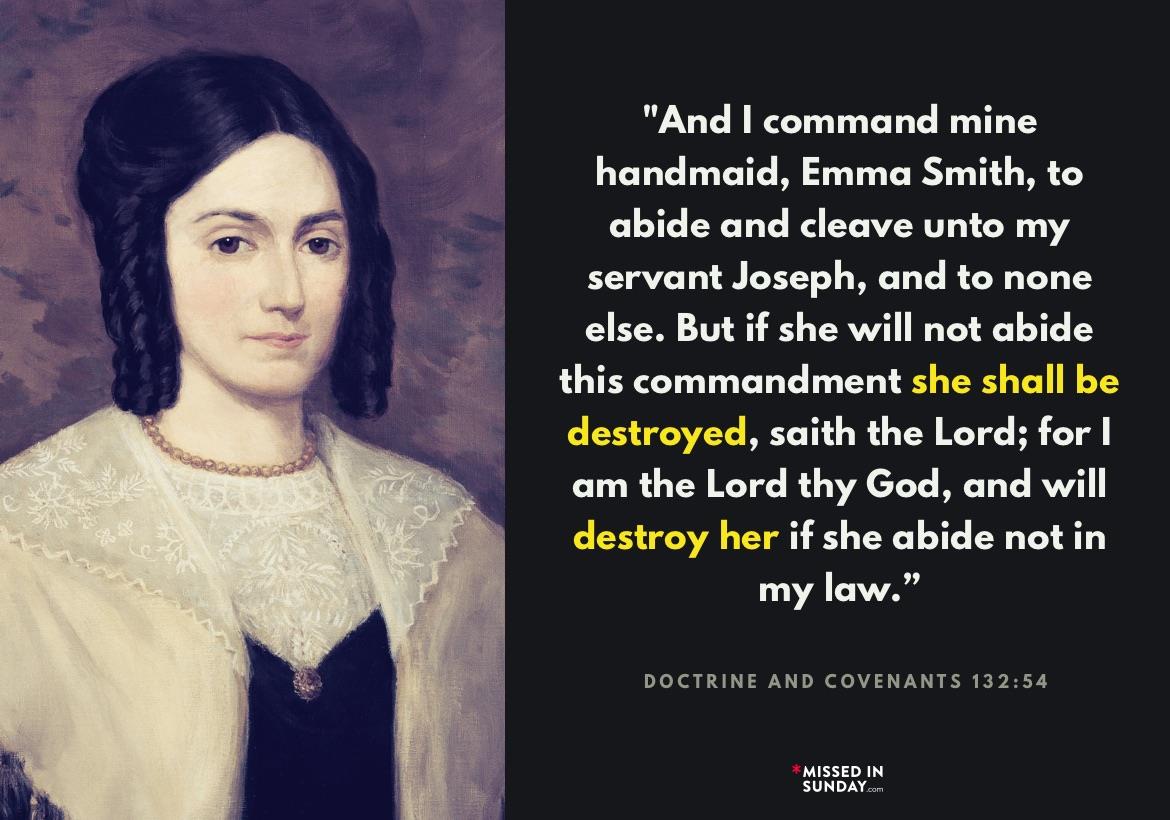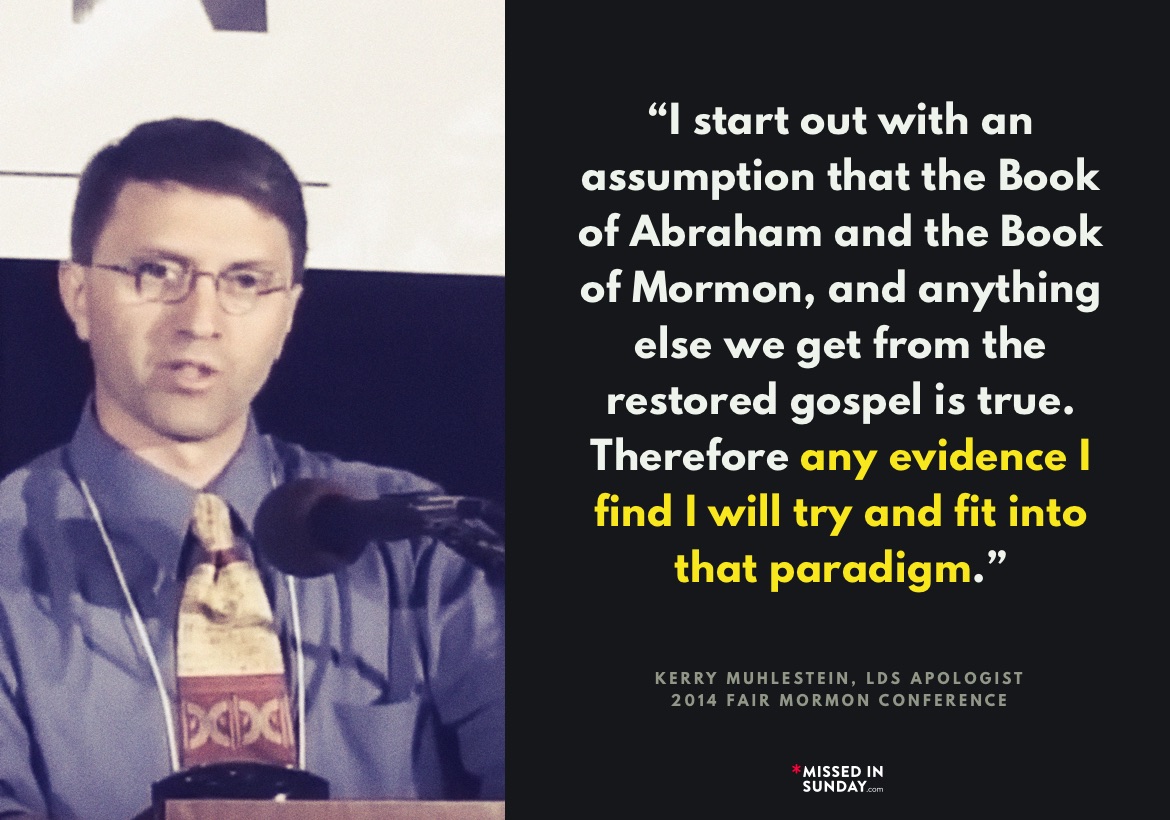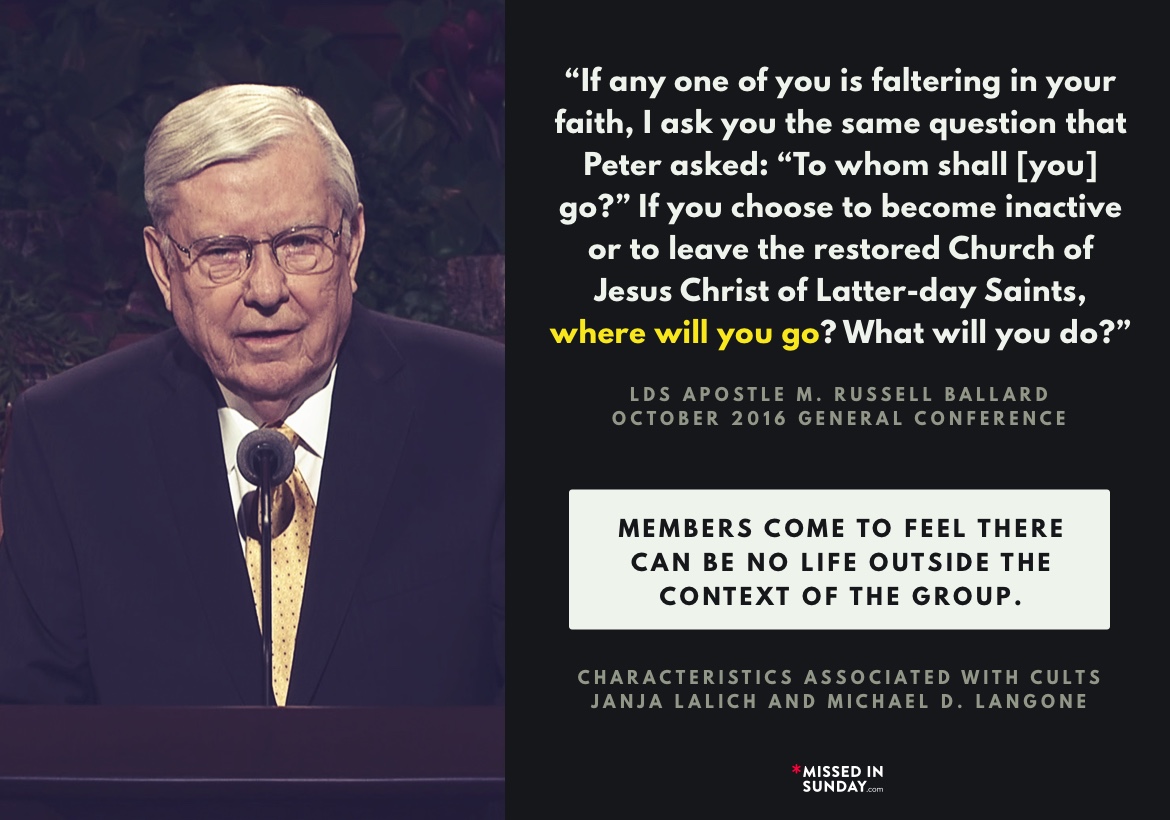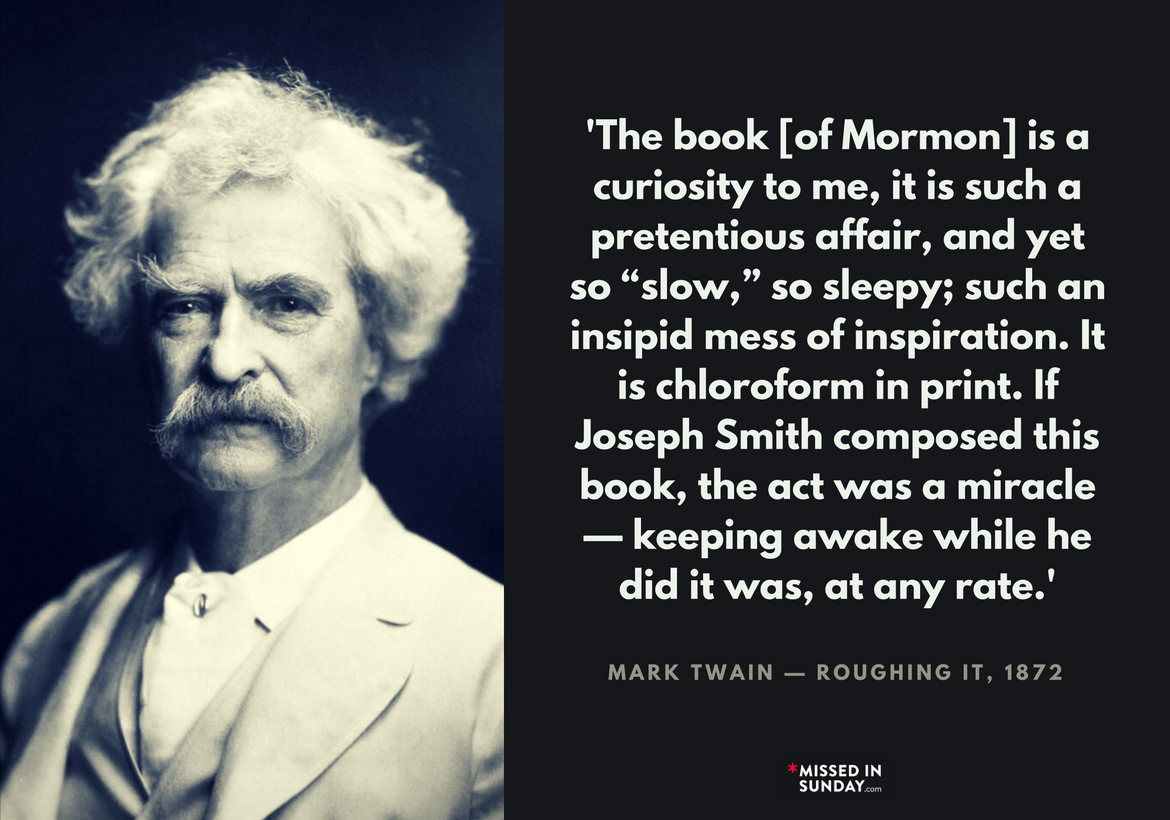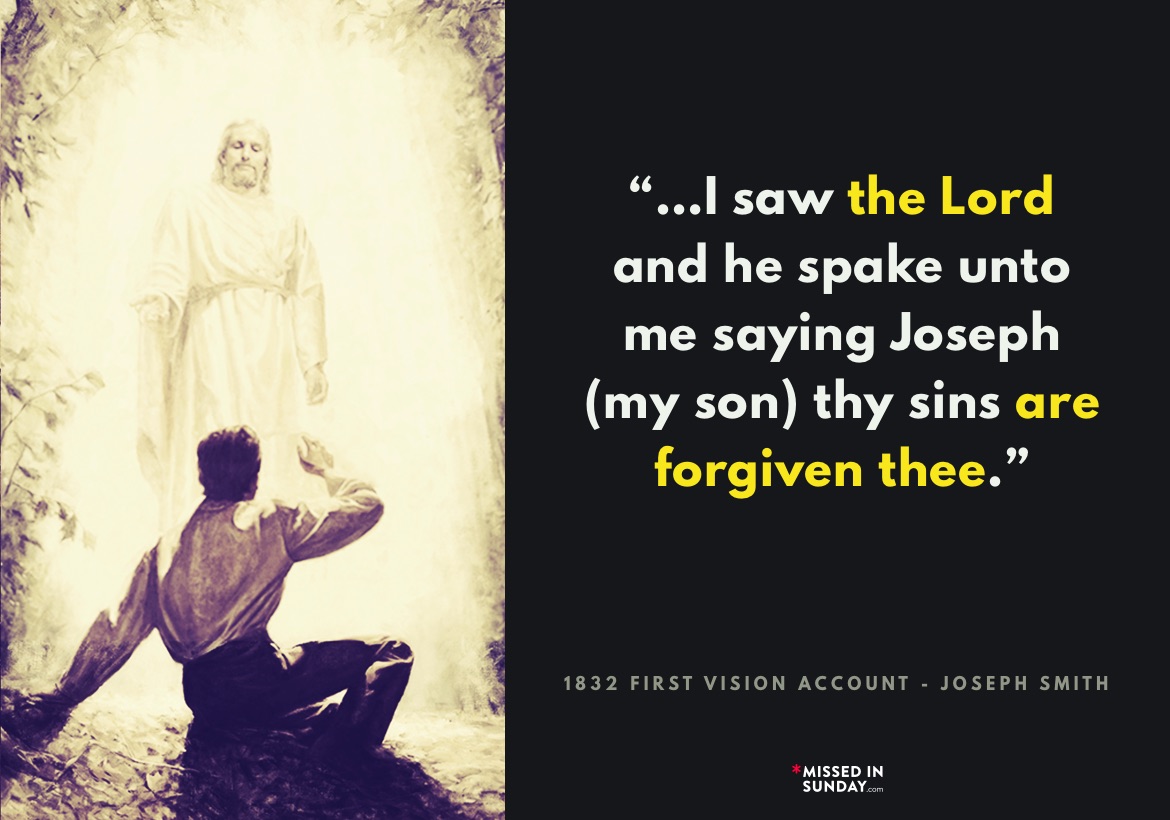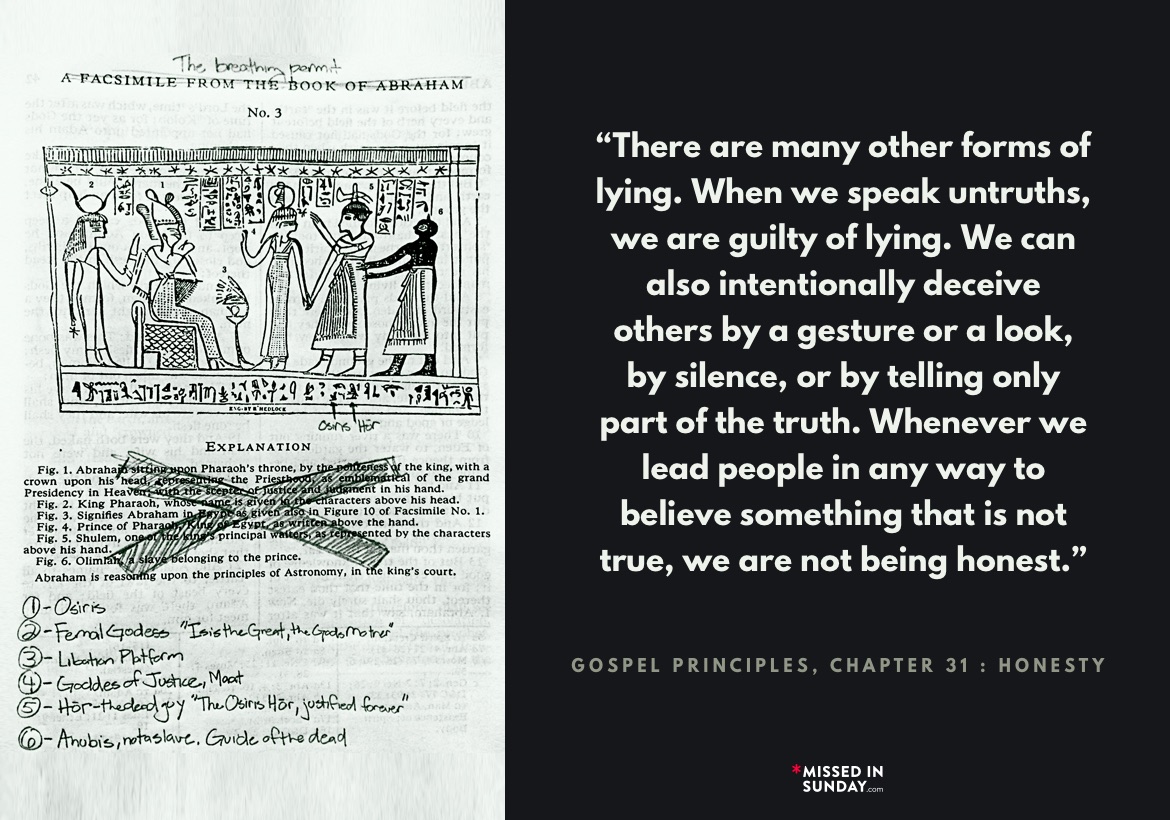Image: Portrait of Emma Smith, wife of Joseph Smith Jr.
*Post with commentary*
The polygamy revelation in D&C 132 [footnote]Doctrine and Covenants 132 – LDS.org[/footnote] has been a ‘hot potato’ the LDS church has had to constantly juggle. Discard it—you lose a pillar of celestial marriage doctrine. Keep it—you canonize an abusive practice.
This year’s (2017) official Sunday School lesson manual deftly avoids any mention of polygamy, cherry picking verses 7, 19–24, 30–31. It instructs the teacher to avoid discussing polygamy and instead focus on the concept of eternal marriage. I am going to look at the bits you might have missed in Sunday School.
The setting.
The revelation regarding polygamy was recorded in the summer of 1843. At the time Joseph had over 20 wives, several of whom were already married to other men. Emma, only recently made aware of (some of) Joseph’s polygamous unions was resistant the doctrine. Exasperated with Emma’s stubbornness, Joseph restricted her from receiving the endowment, unless she ‘acquiesce to the request’. Two days after Emma’s birthday (July 12), Hyrum told Joseph ‘If you will write the revelation on Celestial Marriage, I will take and read it to Emma, and I believe I can convince her of its truth, and you will hereafter have peace.’ At which point Joseph dictated the revelation to William Clayton “sentence by sentence.” Upon returning from delivering the revelation to Emma, Hyrum recounted that “I have never received a more severe talking to in my life.” To which Joseph replied “I told you you did not know Emma as well as I did.”
So with that context in mind, section 132 will start to become clearer. I recommend reading it in its entirety.
The context of the 1843 revelation is about polygamy and concubinage.
“1 Verily, thus saith the Lord unto you my servant Joseph, that inasmuch as you have inquired of my hand to know and understand wherein I, the Lord, justified my servants Abraham, Isaac, and Jacob, as also Moses, David and Solomon, my servants, as touching the principle and doctrine of their having many wives and concubines—”
Here we also learn that polygamy is considered doctrinal, and later a law. Note that Isaac only had one wife, Rebekah.
The ‘new and everlasting covenant’ was synonymous with polygamy. Though later expanded to include other rites and ordinances.
“For behold, I reveal unto you a new and an everlasting covenant; and if ye abide not that covenant, then are ye damned; for no one can reject this covenant and be permitted to enter into my glory.”
“6 And as pertaining to the new and everlasting covenant, it was instituted for the fulness of my glory…”
Brigham Young and other early leaders often taught that polygamy was a requirement for highest exaltation.
“The only men who become Gods, even the Sons of God, are those who enter into polygamy.” – Brigham Young, Journal of Discourses, Vol.11, p.268 – p.269
Those who don’t marry under the law or who are single, become servants for those married under the law.
“16 Therefore, when they [those who marry outside of the covenant] are out of the world they neither marry nor are given in marriage; but are appointed angels in heaven, which angels are ministering servants, to minister for those who are worthy of a far more, and an exceeding, and an eternal weight of glory.”
“17 For these angels did not abide my law; therefore, they cannot be enlarged, but remain separately and singly, without exaltation, in their saved condition, to all eternity; and from henceforth are not gods, but are angels of God forever and ever.”
“20 …Then shall they be gods, because they have all power, and the angels are subject unto them.”
The theology at this point hadn’t evolved to include eternal progression or post-death unions. Rather, condemning the unwed to eternal servitude.
Women are said to be GIVEN and TAKEN throughout the revelation. (Emphasis added)
“37 Abraham RECEIVED concubines, and they bore him children…”
“38 David also RECEIVED many wives and concubines…”
“39 David’s wives and concubines were GIVEN unto him of me…”
“44 …then shall you [Joseph] have power…to TAKE her and GIVE her unto him that hath not committed adultery.”
“62 And if he have ten virgins given unto him by this law, he cannot commit adultery, for they BELONG to him, and they are GIVEN unto him; therefore is he justified.”
The lord condones David’s & Solomon’s polygamy in D&C after condemning it in the Book of Mormon.
“37 Abraham received concubines, and they bore him children; and it was accounted unto him for righteousness…”
“38 David also received many wives and concubines and also Solomon…and in nothing did they sin save in those things which they received not of me.”
“Jacob 2:24 Behold, David and Solomon truly had many wives and concubines, which thing was abominable before me, saith the Lord…”
If a wife’s husband commits adultery, Joseph has the power to ’take and give her’ to another man.
“44 And if she hath not committed adultery, but is innocent and hath not broken her vow, and she knoweth it, and I reveal it unto you, my servant Joseph, then shall you have power, by the power of my Holy Priesthood, to take her and give her unto him that hath not committed adultery but hath been faithful; for he shall be made ruler over many.”
…
Emma may have threatened to practice plural marriage herself.
“51 Verily, I say unto you: A commandment I give unto mine handmaid, Emma Smith, your wife, whom I have given unto you, that she stay herself and partake not of that which I commanded you to offer unto her; for I did it, saith the Lord, to prove you all, as I did Abraham, and that I might require an offering at your hand, by covenant and sacrifice.”
“54 And I command mine handmaid, Emma Smith, to abide and cleave unto my servant Joseph, and to none else…”
From William Clayton’s journal, “This A.M. President Joseph took me and conversed considerable concerning some delicate matters. Said [Emma] wanted to lay a snare for me. He told me last night of this and said he had felt troubled. He said [Emma] had treated him coldly and badly since I came…and he knew she was disposed to be revenged on him for some things. She thought that if he would indulge himself she would too.”
…
The lord threatens to destroy Emma, unless she falls in line.
“54 And I command mine handmaid, Emma Smith, to abide and cleave unto my servant Joseph, and to none else. But if she will not abide this commandment she shall be destroyed, saith the Lord; for I am the Lord thy God, and will destroy her if she abide not in my law.”
“64 And again, verily, verily, I say unto you, if any man have a wife, who holds the keys of this power, and he teaches unto her the law of my priesthood, as pertaining to these things, then shall she believe and administer unto him, or she shall be destroyed, saith the Lord your God; for I will destroy her; for I will magnify my name upon all those who receive and abide in my law.”
…
If you lie about being a virgin you shall be destroyed.
“52 And let mine handmaid, Emma Smith, receive all those that have been given unto my servant Joseph, and who are virtuous and pure before me; and those who are not pure, and have said they were pure, shall be destroyed, saith the Lord God.”
The lord tells Emma to forgive Joseph his indiscretions.
“56 And again, verily I say, let mine handmaid forgive my servant Joseph his trespasses; and then shall she be forgiven her trespasses, wherein she has trespassed against me…”
Joseph establishes rules for plural marriage… and then breaks them.
“61 …if any man espouse a virgin, and desire to espouse another, and the first give her consent, and if he espouse the second, and they are virgins, and have vowed to no other man, then is he justified; he cannot commit adultery for they are given unto him; for he cannot commit adultery with that that belongeth unto him and to no one else.”
“62 And if he have ten virgins given unto him by this law, he cannot commit adultery, for they belong to him, and they are given unto him; therefore is he justified.”
“63 But if one or either of the ten virgins, after she is espoused, shall be with another man, she has committed adultery, and shall be destroyed; for they are given unto him to multiply and replenish the earth…”
1 – The first wife must give consent (Law of Sarah)—Emma only approved of perhaps 4 of Josephs 34+ wives.
2 – They must be virgins and not married—Though Joseph married virgins, he also married other mens wives.
3 – The purpose of polygamy is to ‘multiply and replenish the earth’—Not only did Joseph avoid producing offspring through these polygamous unions, later polygamous practices often resulted in fewer children.
If Emma is still resistant to polygamy she has transgressed and Joseph doesn’t have to get her consent.
“65 Therefore, it shall be lawful in me, if she receive not this law, for him to receive all things whatsoever I, the Lord his God, will give unto him, because she did not believe and administer unto him according to my word; and she then becomes the transgressor; and he is exempt from the law of Sarah, who administered unto Abraham according to the law when I commanded Abraham to take Hagar to wife.”
Crash Course:
Did Emma Smith approve of polygamy?
D&C 132: A revelation of men, not God – Mormon Stories
Doctrine and Covenants 132 – Joseph Smith Papers
Year of Polygamy (Podcast)

